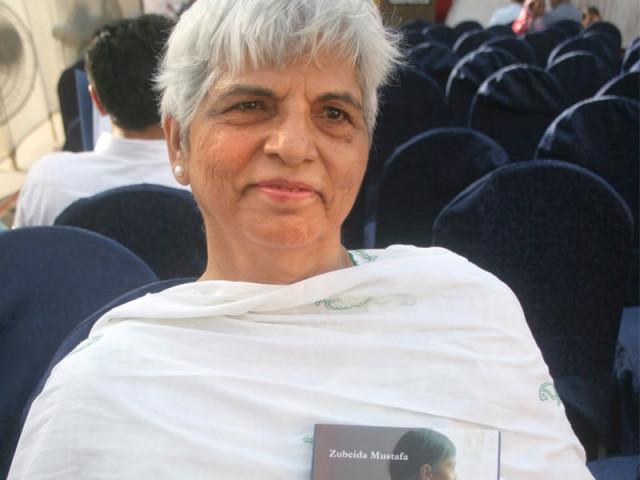Book launch: ‘Teach children in their mother language, build their self-confidence’
Zubeida Mustafa launches her book.

Book launch: ‘Teach children in their mother language, build their self-confidence’
Are we restricting our children’s cognitive development by teaching them in a foreign language in primary schools? Dawn columnist Zubeida Mustafa certainly believes so.
After extensive research and a great deal of groundwork, Mustafa launched her book ‘Tyranny of Language in Education: The Problem and its Solution’ at the press club on Saturday.
“In education, the medium of instruction is not given enough importance whereas cognitive development is closely related to language,” she told The Express Tribune. “Using English as that medium right from the start, in primary school, is harmful to that relationship.”
In her opinion, forcing children to think and speak in a foreign language, not only crushes their confidence, but also encourages the “rote-learning culture”. Clarifying her stance, Mustafa said that, “I am not against English but I strongly believe teaching children in their mother tongue is the solution. English can take the position of a second language.”
In the blurb of her book, Mustafa wrote, “The failure to look at language as a crucial component of education per se has resulted in our failure to spread literacy and learning in the country”.
Sindh Education Foundation managing director Anita Ghulam Ali hoped that policy makers will read the book and use its information wisely. “Through personal experience, I know of schools in Karachi where children are permitted to only speak in English. This approach makes no sense. You have children speaking English for the few hours they are in school and then back to their mother tongue at home. It doesn’t help.”
Referring to the diverse population of Sindh, Ali said that, “It should be an automatic response to teach children from these cultures in their language to ensure a strong learning curve”.
During the panel discussion, Dr Jaffar Ahmed, the director of the University of Karachi’s Pakistan Studies Centre, supported Mustafa’s thesis.
Quoting a line from her book, he said that by adopting the Mustafa solution, Pakistan has “nothing to lose but its ignorance”.
Former education secretary, Mehtab Rashidi agreed and said that the dominance of English in government exams, such as the CSS exam, restricts many candidates from securing good positions. Rashidi dismissed the theory that if children are not taught English from the start, they will not be able to learn the language later.
“I studied in Sindhi throughout primary school and when I was taught in English in secondary school, I did not have any trouble,” she said.
“Today, I look at my children who studied only in English and they have no clue about the Sindhi language or its rich literature. It is truly unfortunate.”
Another panellist, Ghazi Salahuddin, spoke about Bangladesh’s success. He attributed it to the fact that the children are taught in their tongue.
“Today, Bangladesh is ahead of Pakistan in almost every aspect because they teach, learn and speak in one language that the children relate to.”
Kishwar Hameed, who has been in the field of education for the past 27 years, said that, “After 64 years and [the government has] still no plan in sight. The children of today are confused”. According to her, this has resulted in students not being able to read, write or listen properly in either language.
Published in The Express Tribune, May 29th, 2011.


















COMMENTS
Comments are moderated and generally will be posted if they are on-topic and not abusive.
For more information, please see our Comments FAQ